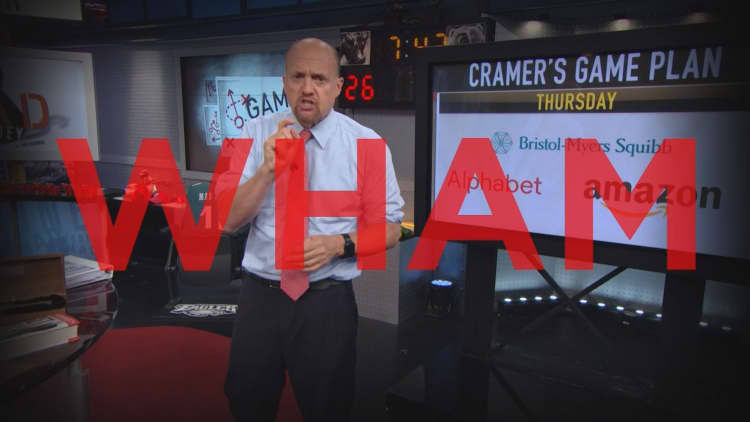
Jim Cramer does not like the set-up of the stock market going into next week. Historically, this is the week that can create collateral damage that can extend to the entire market.
"If you want to buy stocks, my advice is to wait until the end of next week, not the beginning," the "Mad Money" host said.
Going into the week with a tough set-up, any earnings that are less than perfect could leave investors regretting that they didn't take profits beforehand.
With this in mind, Cramer outlined the stocks he will be watching next week:
Apple: This will be the real test to Cramer's "own Apple, don't trade it" philosophy. He expects another no-growth quarter and the bears could be on the prowl in full force. Even worse, the stock has run up into the quarter with the expectation that it won't be bad.
"Believe me, it can be … I expect that this quarter could actually hurt the whole market — yes, Apple is that big — so beware," Cramer said.
Investment professionals can create machines with fancy algorithms for trading and snazzy software for picking stocks to protect portfolios, but Cramer knows investing all boils down to one word: diversification.
"I am offering a new kind of diversification that can help you, guide you toward what kinds of stocks I want you to have if you are going to manage your money yourself," Cramer said.
So for the retail investors out there, Cramer is sharing his top tips on how to manage your own portfolio.
Cramer recommended a personal portfolio with a minimum of 10 stocks and maximum of 15. That range allows investors to keep track of each stock and still do their homework.
In order to protect your portfolio, Cramer recommended covering the following five specific areas:
1. Gold
2. A dividend-paying stock with a high yield
3. Growth stocks
4. Speculative stocks
5. Stocks from a healthy geography
The first stock Cramer recommended is a dividend-paying stock. After all, interest rates are headed higher whether we like it or not, he said. In a world where you cannot get enough income from bonds or certificates of deposit to really live on, a stock with a high yield is necessary.
"You need to own a stock — at least one, possibly more — with a big, high-yielding dividend, but unlike when we diversify by sector, owning two or even three high-yielders, but no more than that, can actually be a good thing," Cramer said.
That doesn't mean investors should own five dividend stocks, as then they would not be protected in the event that long-term treasury bond yields spiked higher to compete with the dividend stocks.
So in order to embrace Cramer's new way of diversification, a high-yielder is necessary. Dividends protect stocks and are a great way to add profits into your pocket. It's a win-win.
Next on his list were speculation stocks. Cramer always talks about specs, but what exactly does he mean?
These stocks present higher risk, but also offer higher reward. Something to keep you interested!
When compared with the standard fare in Cramer's other strategy — think dividend yields and growth stocks — a high-risk stock hardly seems to make sense. Speculation always seems to be that dirty little word investors are told to avoid.
"Not only is it okay for you to own those tempting, risky, broken-seeming stocks that trade in the single digits, it's a necessity, as long as you follow my rules and speculate wisely," Cramer said.
Growth stocks come next. But how can you tell if a stock is, in fact, a growth stock? Use basic algebra — that's how to tell. Here's the methodology that Cramer uses:
"The share price, P, equals the earnings per share, E, times what's known as the multiple, M," Cramer said. In other words, "E times M equals P."
"The multiple is the key. It tells us what investors are willing to fork over for a company's future earnings. And the most important factor influencing multiple is the company's growth rate," Cramer said. "The Street will pay a bigger multiple for businesses with faster growth because that growth means the earnings will get larger and larger in the years ahead."
What does a healthy geography mean? Previously, Cramer would have recommended adding foreign exposure to a portfolio. But now that he has seen the damage left behind from Europe, China and the emerging markets, he tweaked that definition.
"What you really need is a stock that is in a safe geography. At times, when the United States is growing more slowly than the rest of the world, you need something international — and not just something that does a lot of business overseas," he said.
Cramer means a company actually headquartered in a foreign country. The "Mad Money" host referred to a safe geography because foreign stocks are not always a good idea.
Sometimes, when it seems like the world is falling apart, the domestic security of the U.S. will shield your portfolio from the dangers of the rest of the world.



